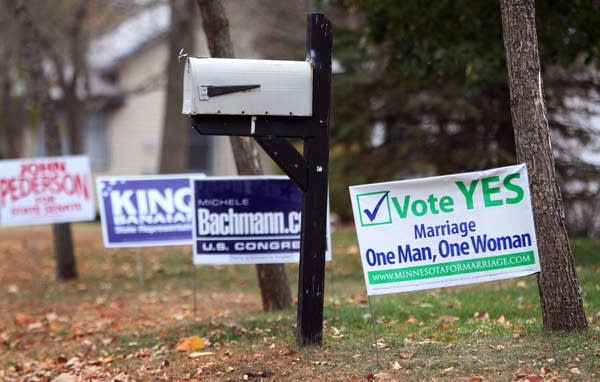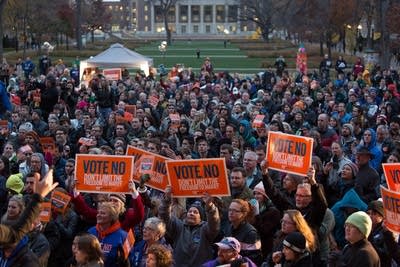What happens if amendment votes end in a tie?
Go Deeper.
Create an account or log in to save stories.
Like this?
Thanks for liking this story! We have added it to a list of your favorite stories.

The two hotly contested constitutional amendment questions on the statewide ballot in November could end up being decided by razor-thin margins, but neither result would be subject to an automatic recount.
Polls show that Minnesotans are closely divided on the proposed amendment that would make marriage only between a man and a woman. Voters are less split over a proposed amendment that would require voters to bring photo identification to the polls. But both vote tallies could be close.
State law provides for automatic recounts only in close contests between candidates. A constitutional amendment tie vote would have to be addressed in court.
After statewide recounts in the 2008 U.S. Senate race and the 2010 gubernatorial contests, Minnesotans may be growing accustomed to close elections.
Turn Up Your Support
MPR News helps you turn down the noise and build shared understanding. Turn up your support for this public resource and keep trusted journalism accessible to all.
Automatic recounts at state expense are triggered when a candidate's margin of victory is less than one-half of 1 percent. Larger margins can also be challenged, but the candidate who demands a recount has to pay the bill.
Secretary of State Mark Ritchie said constitutional amendments do not fall under the same recount rules. But he said the law does allow for a challenge to amendment results and a way to re-examine the ballots.

"If an individual believes there is some question about the results, they can appeal directly to the Minnesota Supreme Court, who has the jurisdiction to set up a panel of judges to do what we call a contest," Ritchie said. "And that's typically the name of a court review of an election result."
Such disputes are handled by a three-judge panel appointed by the chief justice of the Minnesota Supreme Court. That's what happened in 2008, when an automatic recount of the U.S. Senate race between Democrat Al Franken and incumbent Republican U.S. Sen. Norm Coleman determined that Franken had won the race. Coleman later contested the results, prompting a panel to more closely examine the ballots before declaring Franken the victor.
But since 1858, no one has made a similar challenge of a constitutional amendment result.
At state expense, Minnesotans can contest election results over voting irregularities, the number of votes or specific election law violations. Ritchie said the judges have wide latitude for handling such disputes.
"It would be up to the judges to decide how comprehensive of a review, and then to decide who they would like to ask to come to their assistance," he said.
The latest Star Tribune poll showed a tight race on the amendment to define marriage as only between a man and a woman, with 48 percent supporting it and 47 percent opposed. Support for the amendment to require all voters to show photo identification to vote had a 12-point advantage.
Richard Carlbom, campaign manager of Minnesotans United for All Families, which opposes the marriage amendment, said his focus is on voter turnout. But Carlbom confirmed the campaign is making some preparations for a photo finish.
"If the situation arises that it's a very close election and it is decided that it's going to be challenged by the other side, we are prepared to protect a very narrow victory," he said.

Carlbom would not say whether Minnesotans United is prepared to contest the election result in the event of a very narrow defeat. A spokesman for the pro-amendment campaign Minnesota for Marriage could not be reached for comment.
Minnesota's recount experiences in 2008 and 2010 showed that re-examining ballots by hand to determine voter intent can result in some increase in the vote totals.
But Mark Halvorson, founder and former director of Citizens for Election Integrity Minnesota, said his analysis shows the increases are small.
"There's no magic formula here," Halvorson said. "But I would say any margin of victory for either side outside of several hundred votes, I would say it's not worth conducting a recount. Because there would not be enough votes made up by voter intent."
Ratification of a constitutional amendment requires the approval of a majority of those voting in the election, not just a majority of those voting for the question. That means anyone who doesn't mark their ballot for an amendment is essentially voting no.







